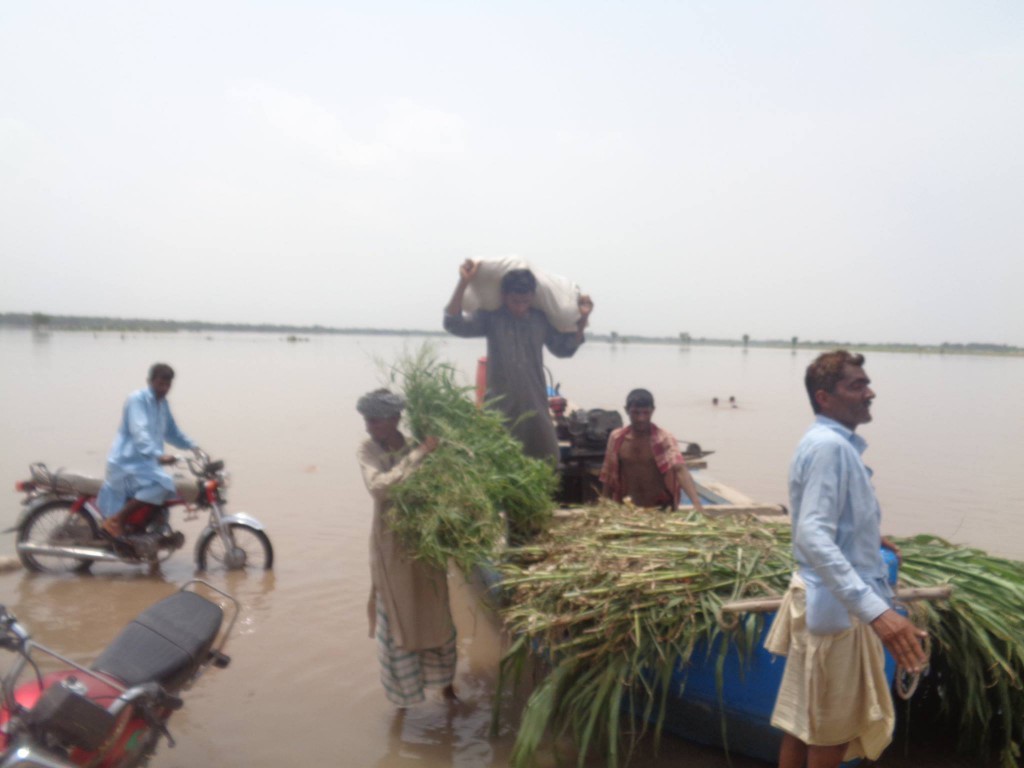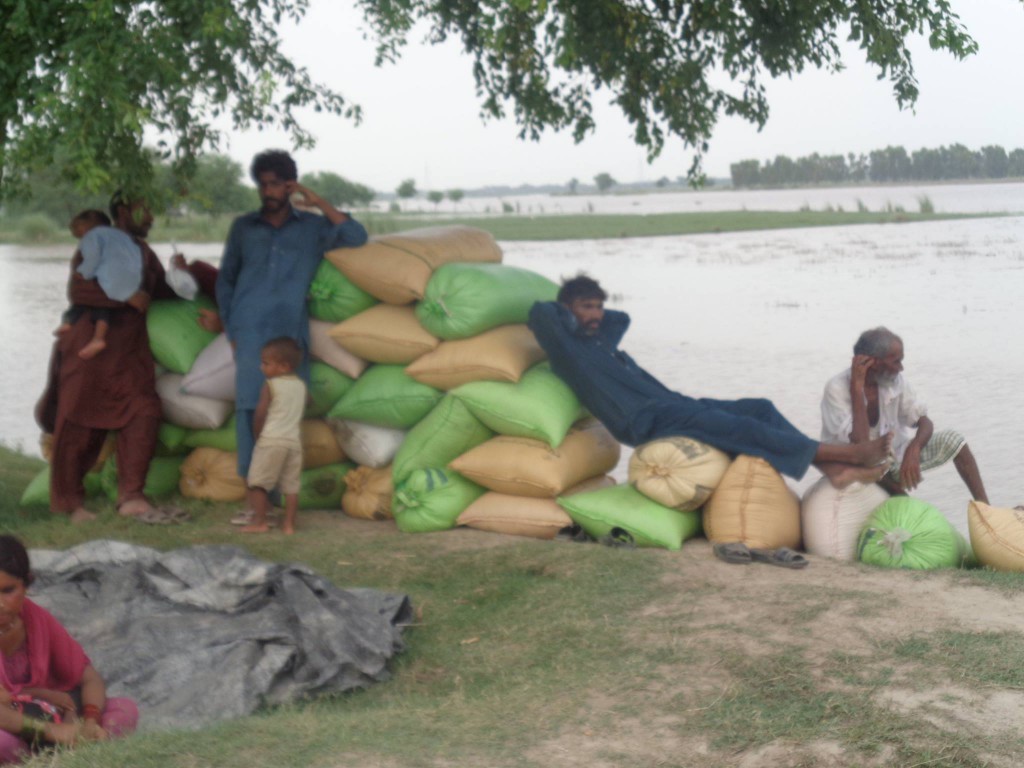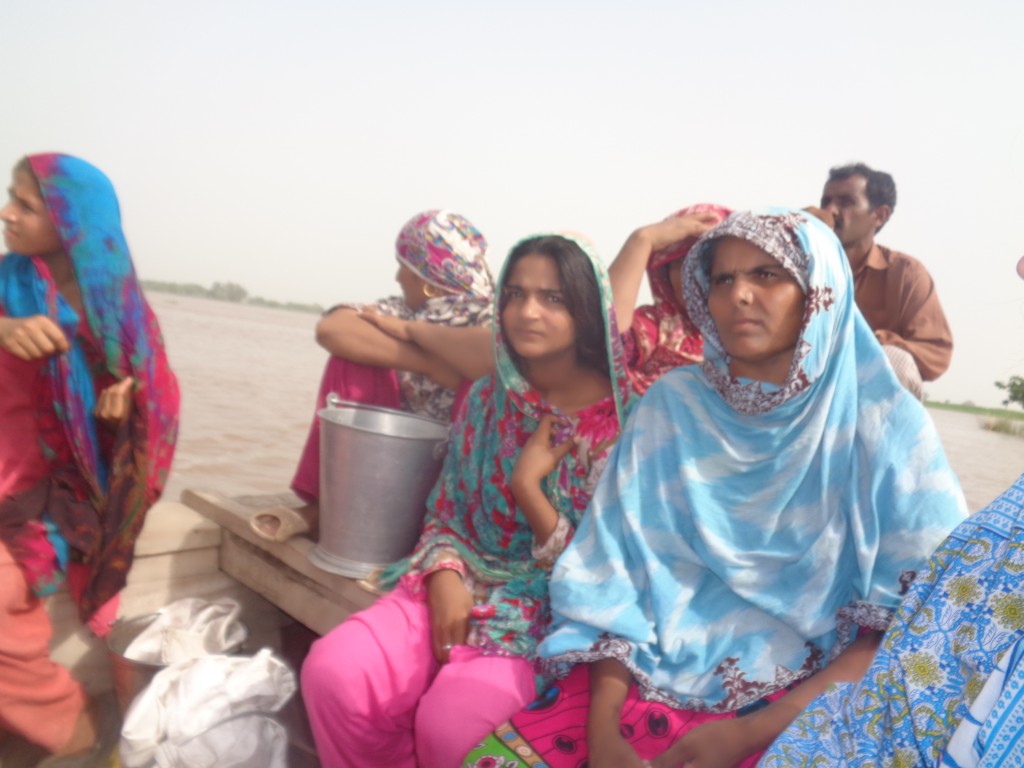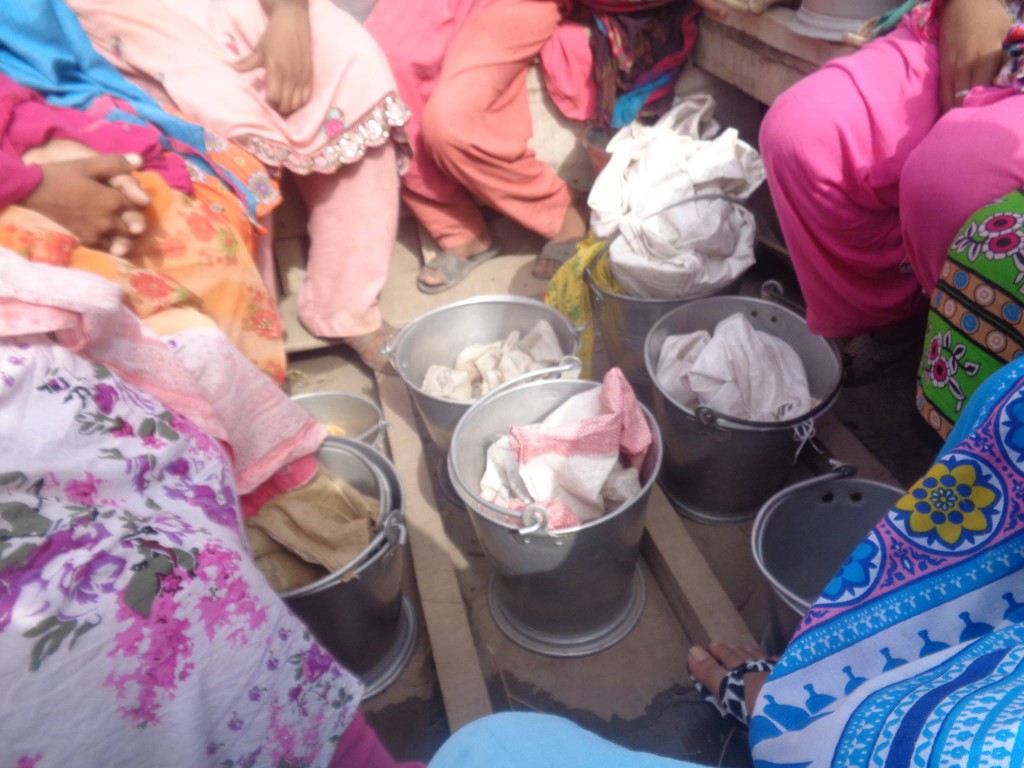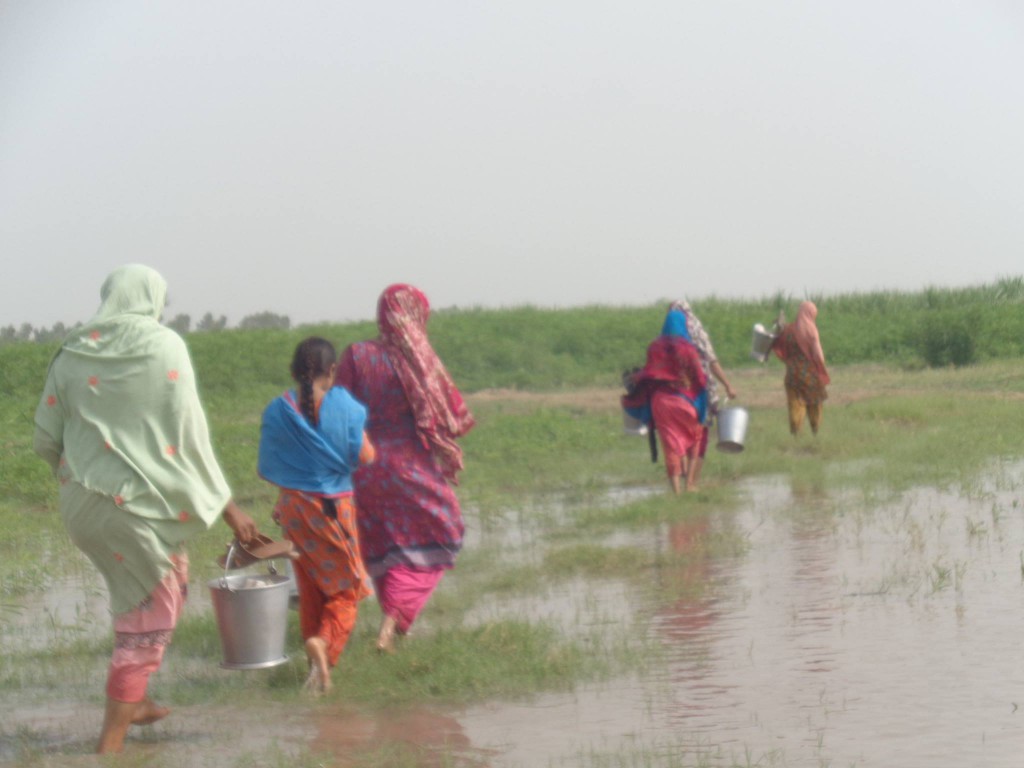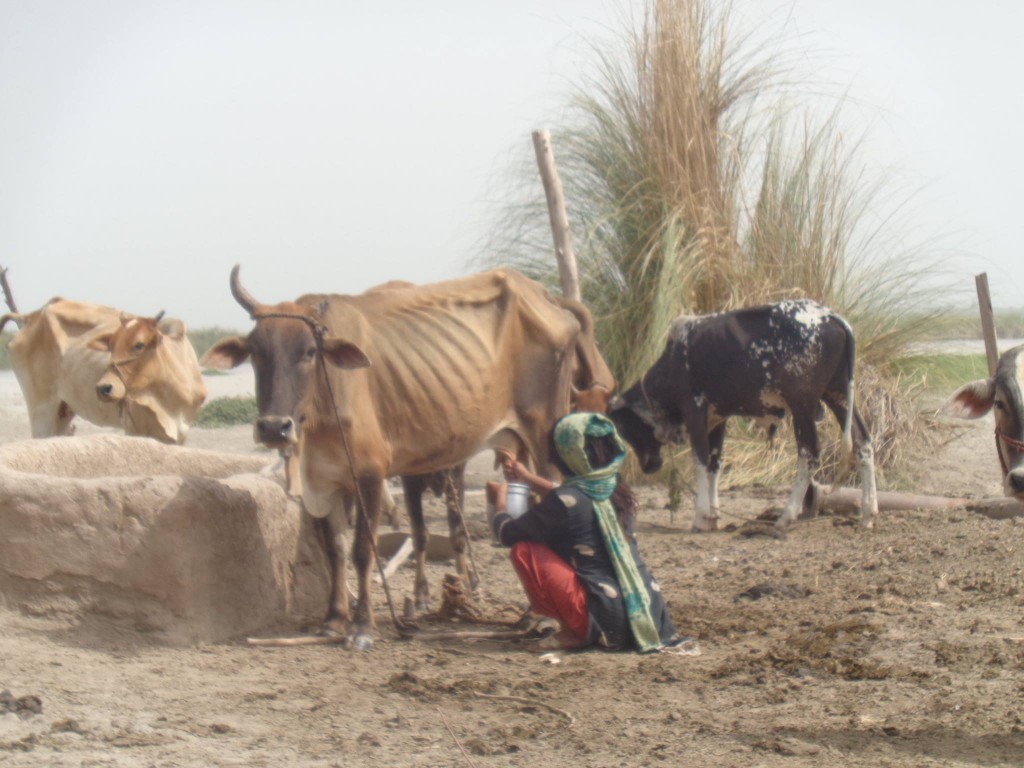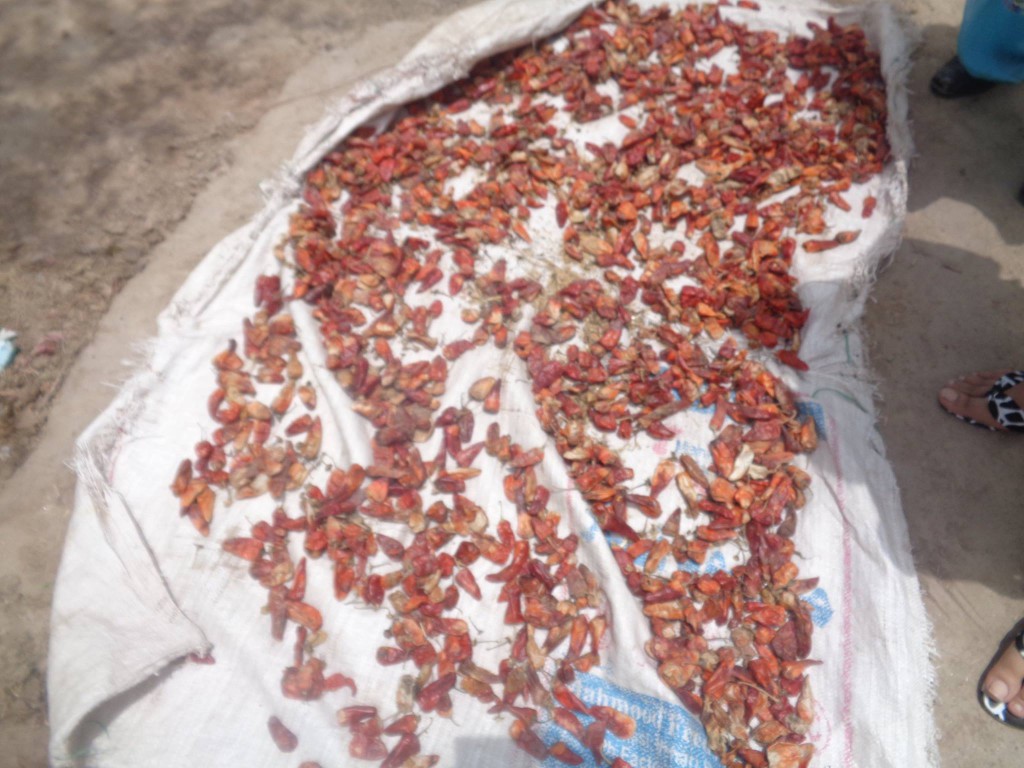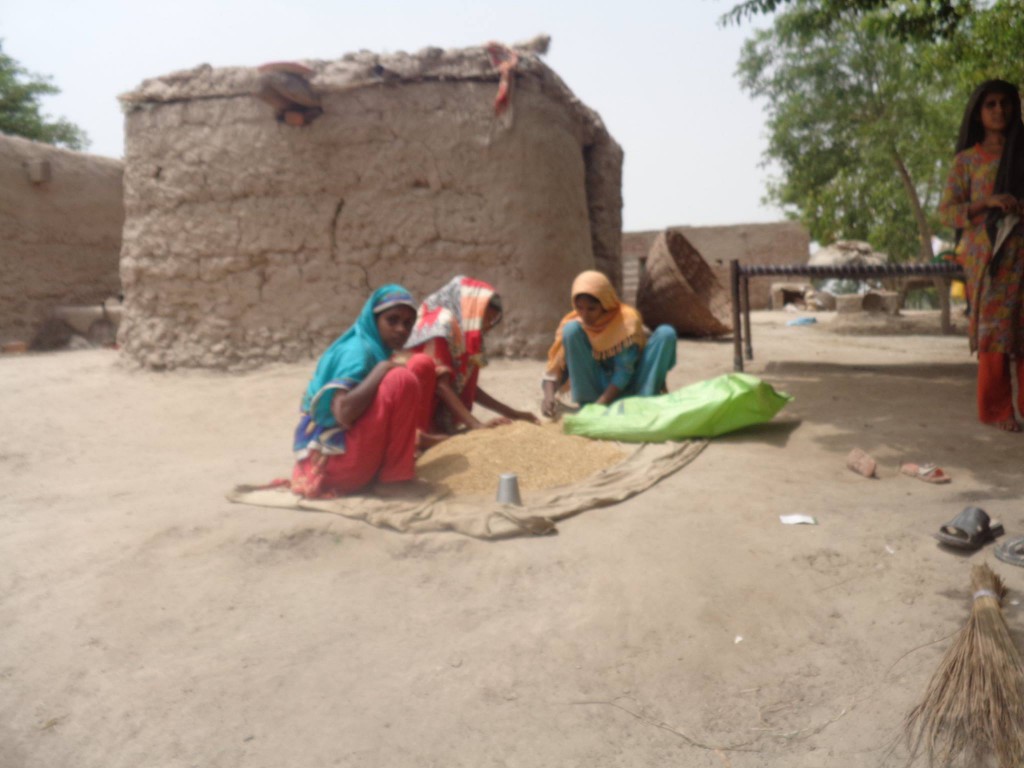It was March 1st when suddenly unexpected flooding in the River Chenab created havoc in the lives of villagers living on the banks of Chenab in Multan District. Small farmers, a vast majority of which were actually leasing land, lost their precious wheat harvest, which was just days away from being harvested. These very farmers had also suffered from the Monsoon floods in September 2014. They had been displaced at that time, then once again in March. And now once again the much-feared monsoon is here. So in essence, in a ten-month period villagers have moved from their abode thrice; for many farmers, they were not able to go back to their original abode as that area was submerged in water. Waters when they receded did so only partially. The poorest, most marginalized have no permanent residence. They are forced to live in areas that is not taken up by others.
The kachaarea farmers, that is riverine belt farmers who live outside the embankments (made by the government to save the agricultural land and communities) watch the rising water levels and anxiously seek news on flood waters coming from upper regions of the country and from across the border in India. For those of us who do not face the daily torture of living next to ‘sleeping dragon’ are oblivious to the anxiety and helplessness of the kachaarea communities.
Most of the farmers living on the river banks are landless – they lease land for the year – paying in the range of Rs 12,000 to Rs 24,000 for the year. If you ask them how much do you pay – their response is not in monetary figures – instead they will say 10 maunds of wheat which is approximately Rs 12,000. Their response tells us that for them, land is food, and to access land is to ensure their food security. However, this must be a very bitter payment given the land is submerged in water for nearly four months of the year. The landlords, irrespective of flooding demand the full payment. The oppression of the feudal system can be seen vividly in the riverine areas. According to a farmer “zamindardariyamaezameendubnaedaega per humkokabhizameennahibataega “(A landlord would rather have his land lost to the river rather than distribute it to the us – the landless).
Apart from the constant exploitation of the landlords, riverine farmers have to deal with many other atrocities and hardships, daily. Now that the water levels are rising, many communities are already separated from the mainland by the formation of small rivers which are cutting across small parts of land and dividing communities. So, small daily chores have now become painstaking – for example taking children to the neighborhood doctor is now no more a walking journey. People have to walk a distance to the newly formed river, catch a boat – get off on the other side, walk some more to reach the doctor’s clinic, or the market place- and then of course the arduous journey back.
Women agricultural workers also face increased hardship: they work throughout the year in the neighbouring fields of their community. With the entire area divided by the encroaching river water, the surrounding farms are no more approachable by foot. So these women end up taking the local boats from one area to the other, sometimes, even taking two boats or in some cases wading through water holding their tools of trade and children – all for a small meager payment in cash or kind. The general trend is to pay women by the day – generally from Rs 120-150 for a six-hour work period. For many of the food crops such as moongi – women will pick a small-pail full. On picking four pails they get one pail as payment. All this in the blistering heat of Multan – where temperatures are reaching the high forties – the scorching sun and immense humidity makes breathing difficult. It is in such extreme temperatures that men and women work to earn enough for that day’s food.
Hardships
Our team had work in the communities. Of the four villages visited in our two-day work plan, only one village was now accessible by road. For the others we had to use local boats. It was a hot summer day; the sun was shining in its full glory. At the riverside there were many people waiting for the motor boat that was coming nearly every 15-20 minutes carrying passengers to and fro from the two banks. The small boat was jam packed with mostly farmers, men as well as women along with their children;people were sitting close to each other, uncomfortably. Almost all of them were going for work. On our journey on the way back we had to wait for nearly half-an hour on the bank – on the other side of the small river we could see the boat unloading a lot of stuff which included jute bags filled with some produce, milk men carrying with their milk pails and even men who had ferried their motor bikes to the other side. Finally, the boat came for us and we all piled in. We found that our fellow passengers included 9-10 women with some young girls. They were were coming back from picking arvi, which is a root vegetable. For a full day work, they were paid the usual rate of Rs 120 for the six hour work they had put in. It was interesting to observe that they were more concerned about us riding the boat in such hot weather but did not think about their own hardship. They kept on commenting on why did we found it necessary to do our work on such a hot day? For us urban people it was hot – what about them? They had toiled much more than us.
A new member of out team was shocked by the circumstances of the people. She had many questions on the suffering of the people. Why is the daily routine of the villagers so tough? Who is responsible for this? And is there no one to feel seethe pain and sufferings of our most hardworking sector, a sector that is responsible for providing food for the entire country? Why do they work so much? And then in return, all that they have is a meager handful of food and with no amenities that would ease their lives! Why?
As we traveled along with other people in a small boat, a question asked by a woman named Ruquiya underlined the class difference that these marginalized communities face. Her eyes filled with sadness inquired, “we are all humans than why are our conditions so different?”
The question if answered truthfully can only point to the unequal distribution of land where a very small number of people in the country own a majority of the land forcing others to either work as labour or lease land. Both occupations yield a bitter harvest – forcing people to go without all basic needs including food, water, shelter, education and health.
On the second day we went to two other villages again using boats. Our short exposure to the daily hardships of the people gave us a closer view to the enduring hardship of the people. At the same time, it also showed us clearly the ability of our people to survive against such difficult odds. The boat that we took to access the first village was without a motor-boat. It took us about an hour tocross a small distance that would not have taken us more than 10 minutes if we had walked and in a motor boat maybe 15 minutes. Apart from other passengers In the boat, there were 12 agriculture women workers who were going to pick a food crop called moongi. As the boat was pushed off the bank, women kept on calling out to the young children – mostly girls – who had walked with them to the boat, to go back home. It was clear that these women were very uncomfortable leaving their young children at home to fend for themselves: but they had no other option as they had to earn a living or to be more exact, earn the food they would have been able to get as payment in kind.
During the journey we talked to the women getting details of their work. Of these twelve women, one was a small farmer who had come to collect the women for picking moongi from her land; the total land area was no more than five canals (equivalent to just a bit more than half-an acre of land). Each woman would in the end be hardly able to get even a full pail of moongi in return for her labor.
After getting down from the boat we drove to toward the next village – about a 15 minute drive. Then we took a self-made raft to the next bank. Village people hade made it with styrofoam wrapped in cloth and put an old wooden door on the top. The door still had nails and hinges protruding which was unsafe as it was rusty and could cause injury. The ‘boatman’ told us that if pushed he could actually seat 18 people on the raft if they would sit with their backs to each other in a tight fit. We were only five of ous on the raft and still were finding it difficult to balance our selves. We wondered on the ability of these people to make do and survive no matter what. In any case, after the raft journey we again walked a small distance and then another small raft took us to our destination. On the way back, in the first patch of river the raft was there to take us back. But when we got to the next water inlet, there was nothing to take us further. The small raft had gone with a load full of people to another village. So we decided to walk through the water. According to the community people, it was ok to walk through the water if we walked holding hands a forming a long chain of people. The water-bed was muddy and slippery and it took us a while to cross the small water belt.
 What was a difficult journey for us was routine for the community people. They face the coming and going of river-inlets every few months; they point to a place under water and say this is where they were living just a few months ago; another patch of land was their abode last year and so on. According to the villagers, in the past years water would only come in to their lands during the monsoon season but now even during the winter months they are not safe.
What was a difficult journey for us was routine for the community people. They face the coming and going of river-inlets every few months; they point to a place under water and say this is where they were living just a few months ago; another patch of land was their abode last year and so on. According to the villagers, in the past years water would only come in to their lands during the monsoon season but now even during the winter months they are not safe.
These two days in the riverine communities made it clear what was it to live in the kacha areas. What is narrated here is basically only the journey to the communities. In the boats we saw people coming and going for various reasons – from daily chores such as household marketing to visiting the doctor or buying medicines or going to work. All of this was in addition to their daily living. In villages we saw people keeping small kitchen gardens for their daily food needs; women were maintaining mulching animal so that they could have milk for their daily consumption.
One woman was growing red chilies; she had laid them out for drying. According to her, after the chilies have dried she would pound them to make red chili powder that she sold to a shopkeeper. People had laid out nets and fishing hooks so that they could catch fish. In short, all activity was geared to gaining food and/or a meager livelihood.
The lack of our government in reach to the poorest, most needy was abysmally clear. People would ask us anxiously if there was any news of the flood-waters? How much water was India going to release into our rivers? Has the deal between Nawaz Sharif with Moodi been finalized? The government seems totally ignorant of the daily anxiety of the riverine people. During the March flooding no news media reported on the floods. The government did not make any statement on the destruction in the communities. Farmers lost the wheat harvest which is their food security through the year. Such is the heartlessness of our government.
So then, who is this government for? The rich and the powerful? Those who already have plenty? Those who own vast tracks of land? Those who live in cemented well constructed houses? Those who have so much food in their homes that they don’t even know the cost of wheat flour?


